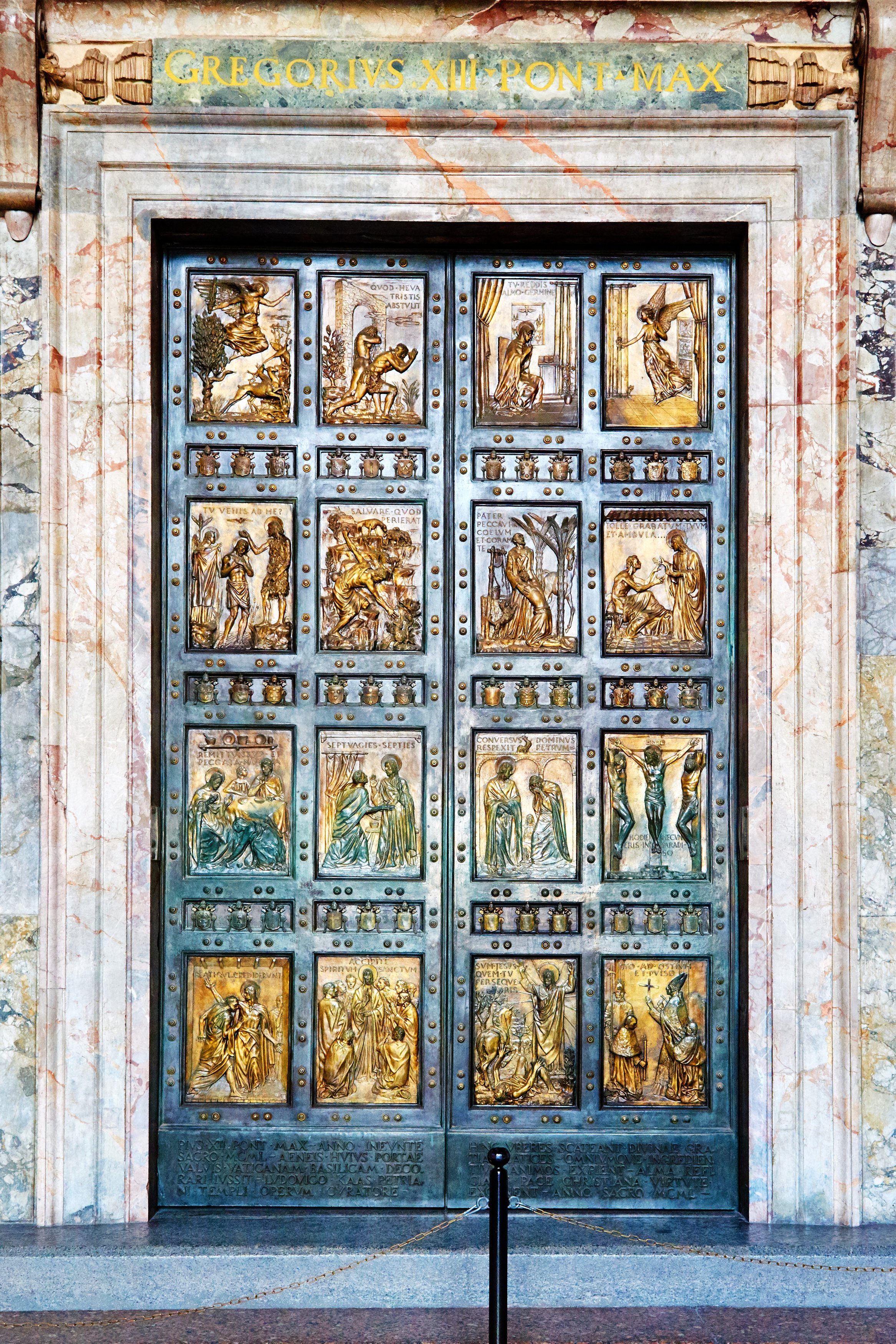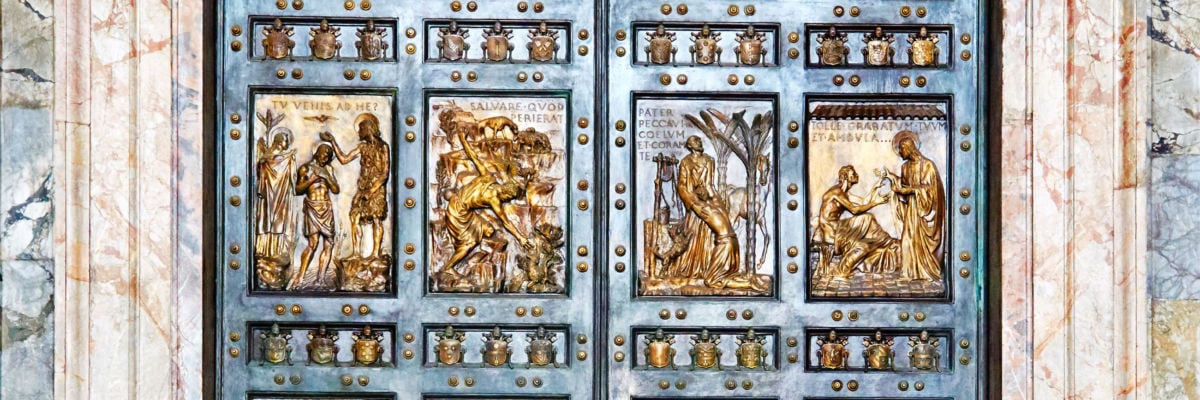
What Is the Year of Jubilee 2025?
The Year of Jubilee is a biblical concept deeply rooted in Scripture and Tradition, offering the faithful a time of renewal, forgiveness, and celebration. Catholic Answers wants to provide resources for the Jubilee Year 2025 so you can make the most of the Holy Year, including navigating frequently asked questions.
Watch this video with senior apologist Tim Staples answer the top ten questions about the Year of Jubilee 2025.
When Is the Next Year of Jubilee?
The next Catholic Jubilee Year is already here! It began on Christmas Eve (December 24), 2024, and ends on January 6, 2026, the Solemnity of the Epiphany of the Lord. During this time, special blessings (including indulgences) will be available to the faithful who participate in designated pilgrimages, prayers, and sacraments.
Jubilee in the Bible
It originates from Leviticus 25:8-55, where God commands the Israelites to celebrate a year of Jubilee every fifty years, a time to rest the land and its agricultural workers, release slaves, and return land to its original owners. Key passages include:
- Leviticus 25:10: “Proclaim liberty throughout all the land to all its inhabitants. It shall be a jubilee for you.”
- Isaiah 61:1-2: “The Spirit of the Lord God is upon me . . . to proclaim the year of the Lord’s favor.”
- Luke 4:18-19: Jesus applies Isaiah’s prophecy, linking the Jubilee to his mission of salvation.
These verses underscore themes of freedom, mercy, and redemption, which remain central to the Catholic faith and life.
Jubilee in the Catholic Church
In the Catholic Church, Jubilee years traditionally occur every twenty-five years. These are known as Ordinary Jubilees and are times of special grace, forgiveness, and renewal. The last Ordinary Jubilee was in the year 2000, which marked the two-thousandth anniversary of Christ’s birth. Now, in 2025, we celebrate the Jubilee theme Pilgrims of Hope.
Pope Francis Jubilee 2025
Many wonder why 2025 is a Jubilee year for Catholics. Pope Francis called this Catholic Jubilee 2025 to celebrate hope and invite Catholics worldwide to deepen their faith. Because it marks the 1,700th anniversary of the First Council of Nicaea, Jubilee 2025 also celebrates the fundamental Christian truth of the Incarnation, that Jesus is both true God and true man, a teaching always believed in the early Church but dogmatically defined at the Council to combat the Arian heresy.
“May the light of Christian hope illumine every man and woman, as a message of God’s love addressed to all!” —Pope Francis
Occasionally, a pope may declare an Extraordinary Jubilee, as Pope Francis did with the Jubilee of Mercy in 2015-2016. These are called to address specific themes or needs within the Church. Both types of Jubilees offer opportunities for pilgrimage, indulgences, and spiritual growth.
The Theme for Jubilee Year 2025
The theme “Pilgrims of Hope” emphasizes the journey of faith and the role of hope in navigating life’s challenges. As part of this theme, Catholics are encouraged to trust in God’s providence and extend that hope to others (see CCC 1817-1821).
Catholic Answers Insight: What is the Significance of the “Pilgrims of Hope”
The theme Pilgrims of Hope for the Jubilee Year 2025 emphasizes the journey of faith, especially the hope found in Christ. As pilgrims, Catholics are called to embark on a spiritual journey, seeking renewal and deeper communion with God. This theme encourages us to trust in God’s promises and be beacons of hope in the world, reflecting the teaching of Romans 15:13: “May the God of hope fill you with all joy and peace in believing, so that by the power of the Holy Spirit you may abound in hope.” It invites us to live out our faith with joy and to inspire others through acts of love and mercy.
Catholic Answers Holy Year 2025 Preparation Checklist
Participating in a Jubilee Year includes several spiritual practices:
- Visiting designated holy sites, such as the four major basilicas in Rome or local churches in your dioceses, symbolizes a journey of faith and conversion.
- Sacrament of Reconciliation: Confession is encouraged to receive God’s forgiveness and grace, as emphasized in John 20:21-23; and—along with receiving the Eucharist—this sacrament is necessary to obtain an indulgence.
- By fulfilling certain conditions, including prayers, a pilgrimage, or acts of charity, Catholics can receive indulgences, which reduce or eliminate temporal punishment for sins.
- Acts of Mercy: Engaging in corporal and spiritual works of mercy, like feeding the hungry or comforting the sorrowful, reflects Christ’s love.
- Prayer and Reflection: Deepening one’s prayer life and reflecting on Scripture strengthens one’s relationship with God.
These practices help Catholics grow in holiness and experience God’s mercy.
Jubilee Year Indulgences: A Catholic Answer Primer on What They Are and Aren’t
The Church offers special indulgences, which are remissions of the temporal punishment of already forgiven sins, not a “get out of jail free card” for future sins. Remitting that punishment—or aftereffects of forgiven sin—includes purifying us of our “unhealthy attachment to creatures” and other created things (CCC 1472). Indulgences are outlined in the Catechism of the Catholic Church (CCC 1471-1479). They are either partial or plenary, remitting some (partial) or the complete (plenary) temporal punishment due to one’s sins, including, again, that associated with our unhealthy attachments to ourselves, other persons, and things—attachments which necessarily cannot exist in heaven (see Rev. 21:27). Indulgences can be obtained for oneself or for one who has died (the faithful departed).
Pilgrimages to designated holy sites, doing acts of charity, and receiving the sacrament of reconciliation are emphasized. The Jubilee is a reminder of God’s mercy and the call to live out the gospel more fully.
Catholic Answers Holy Door Jubilee Explainer
Holy Doors are significant in Jubilee Years. They are special doors in major basilicas, such as St. Peter’s Basilica in Vatican City, which Rome encompasses. The doors are sealed and only opened during a Jubilee. Passing through a Holy Door symbolizes entering a deeper relationship with Christ, as mentioned in John 10:9, where Jesus says, “I am the door.” It represents a spiritual journey and renewal. Pilgrims who pass through a Holy Door can receive a plenary indulgence, under the usual conditions: 1) performance of a designated act; (2-3), reception of the sacraments of confession/reconciliation and Holy Communion; 4) prayer for the pope’s intentions; and 5) detachment from all sin. Passing through a Holy Door is a powerful reminder of God’s mercy and the call to conversion.
Pilgrimages and Holy Doors in 2025
A significant aspect of the Jubilee Year is an invitation to make a pilgrimage to Rome. Catholic pilgrimages to Italy in 2025 focus on visits to the Vatican and Rome, including passing through the opened Holy Doors of Rome’s major basilicas (St. Peter’s Basilica, St. Paul Outside the Walls, St. John Lateran; and St. Mary Major). Passing through a Holy Door symbolizes crossing into God’s grace and mercy.

For those unable to travel, many dioceses worldwide offer local opportunities to gain Jubilee indulgences, thereby reinforcing the universality of the Church.
Catholics Answers Quick Guide on Obtaining Indulgences in the Year of Jubilee
This is Catholic Answers Jubilee Year quick guide on how to obtain plenary indulgences during the Jubilee Year by fulfilling specific spiritual acts. These are:
- Making a pilgrimage to a designated site.
- Participating in confession
- Receiving the Eucharist.
- Praying for the pope’s intentions.
- Being detached from all sin, even venial sin.
Want to Get Better at Explaining Indulgences?
Watch this short video with Jimmy Akin from the archives of Catholic Answers LIVE!
Jubilee Year Events and Celebrations
Jubilee 2025 will include many Vatican celebrations, such as papal Masses, catechetical events, and other opportunities for prayer. The Jubilee of Youth 2025 and events for families will highlight the Church’s commitment to nurturing faith across generations.
FAQs About the Year of Jubilee
- What does Jubilee mean in the Bible? Jubilee signifies a time of liberation, restoration, and renewal, rooted in God’s covenant with his people. The land was given rest from planting and harvesting, those sold into servitude were released and restored to their families, and lands sold during economic difficulties were returned to their original owners.
- Is the Year of Jubilee every Seven years? Seven is indeed the biblical number of perfection, and a Jubilee highlighted that numerological perfection in being celebrated every fifty years in the Old Covenant (7 x 7 + 1; see Lev. 25:8-12). Meanwhile, Catholic Jubilees are declared periodically by the pope.
- When was the last Jewish Year of Jubilee? The exact timing is debated, but the biblical practice ended after the destruction of the Second Temple (A.D. 70).
Catholic Answers Additional Resources for Jubilee 2025
Catholic Answers offers trusted resources to guide you through Jubilee 2025, from the Catholic Answers LIVE podcast to articles and more.
Catholic Answers Primer on Indulgences
Holy Days of Obligation 2025 & 2026
Q & As
Catholic Answers LIVE
- On Christmas Eve, the Year of Jubilee 2025 begins. If I can’t get to Rome, how can I observe the Jubilee?
- What does the “work of mercy” entail for the fulfillment of the plenary indulgence for the Jubilee?


